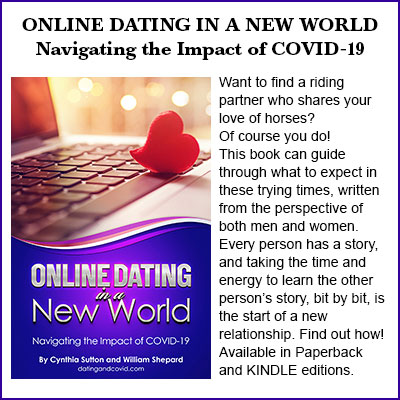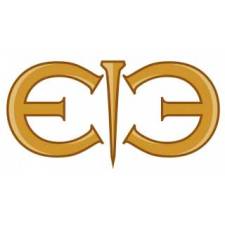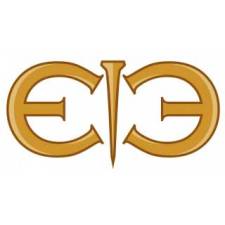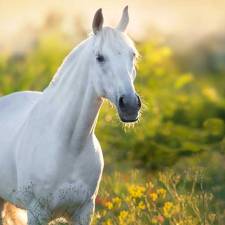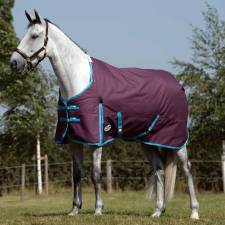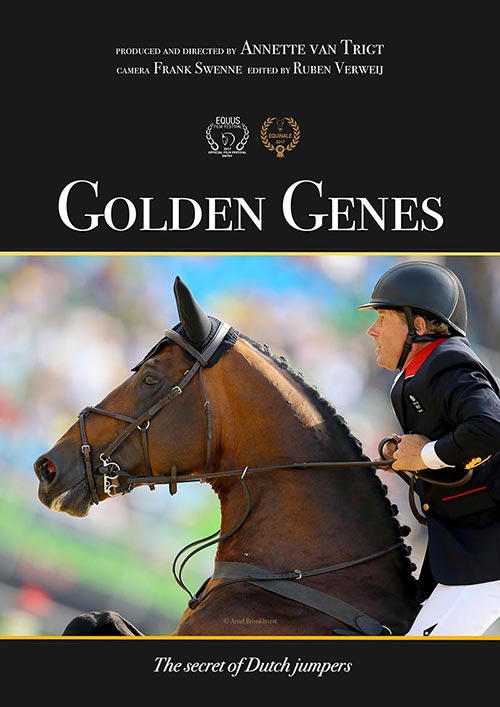
by Heather Wallace
Breeding Excellence into Dutch Sport Horses
There is not an equestrian worldwide who has not heard of the KWPN Warmbloods. Their intelligence, athleticism, character, and technique are renowned in the world of show jumping. “Golden Genes”, a documentary film from Annette van Trigt Productions and 2017 Film Selection for the Equus Film Festival, provides a behind the scenes view into breeding practices of sport horses in The Netherlands.
“Show jumping horses bred in the Netherlands are some of the best in the world. It is no coincidence that foreign riders won gold and silver medals in the Olympic Games of 2008 on Dutch horses. This is big business and passion”. Golden Genes
From the perspective of five breeders, three of whom are in their 70’s, we see an array of methods and best practices but one focused goal- the breeding excellence of this horse. Some breeders have a more monetary focus, while others have seemingly a more emotional approach to their horses, but most are a combination of both. Tom Vullers sums it all by saying breeding is “80% knowledge and 20% intuition”.
The primary difference in the breeding of sport horses from race horses is using artificial insemination and embryo transfer rather than live cover. To be registered for The Jockey Club it is mandatory for the thoroughbred mare to be inseminated by live cover. As a result the desired thoroughbred traits are slower to be bred into new generations and studs may charge higher rates for breeding rights.
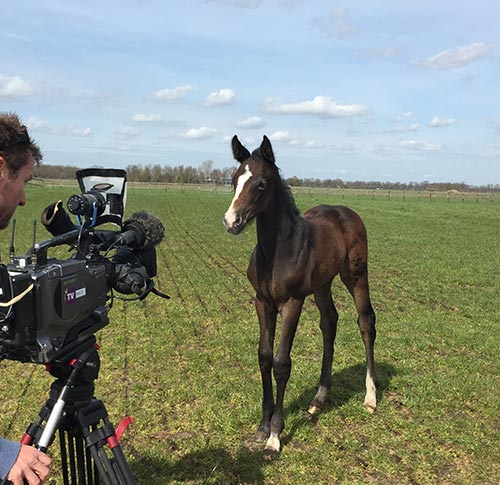
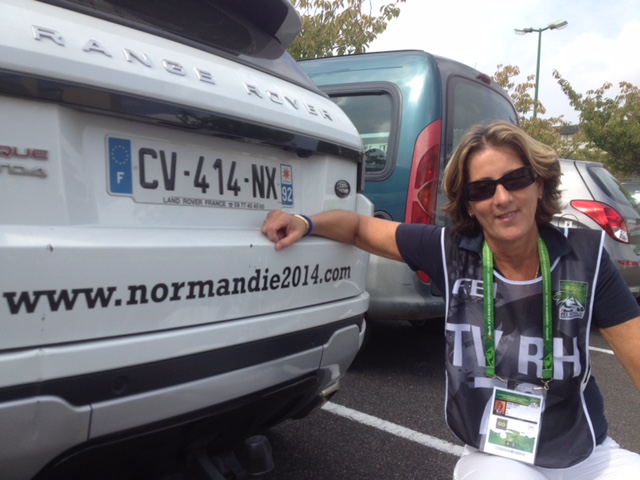
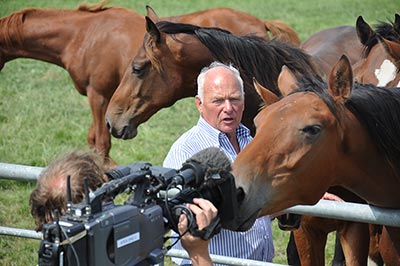
"It was fantastic to follow the breeders. Their enthusiasm and hard work touched me deeply. And when the Dutch breeded Big Star with Nick Skelton on his back won on the Olympics in Rio..an ending you can only dream of as a filmmaker.” - Annette Van Trigt, Director and Producer of Golden Genes: The Secret of Dutch Jumpers
"Golden Genes” is featured in the Equus Film Festival Maryland Tour Stop with a showing on January 19-20, 2018 at the Maryland State Fairgrounds.
Artificial Insemination
With artificial insemination, the stud can impregnate many more mares, breeding for specific traits. More, the semen is more widely available for a lower price, and may be shipped internationally.
In artificial insemination, a stallion is teased by a mare. Her urine may be added to the phantom mount, which replicates the female and allows the stallion to insert his erect penis into the faux vagina and ejactulate into a vial. It takes a three person team to oversee collection. In Wiepke van de Lageweg’s family-run business, 25 studs mount the phantom mount every morning. Each mounting may result in 60-80 tubes of semen which is then tested for motility, count, and more.
Depending on the stud one tube of sperm may cost approximately 1,000 euros per tube, and double that if the mare carries. How many tubes are in a dose? It varies depending on the breeder and dependent on semen motility, density, and count. There are no standards but a single dose may be provided in three to four 0.5ML straws or a single 5ML straw. It is recommended that each mare receive two doses, one each per cycle.
Stallions have two times higher sperm density in April and May, which also coincides with prime show season. Competing stallions do not cover and studs do not compete. Bubulu, bred by Wiepke van Lageweg, was retired after winning the World Equestrian Games in order to stud. One single tube of his semen at the time this documentary was filmed was worth 1500 euro.
Embryo Transfer
Another unique breeding practice in sport horses is embryo transfer. Exercise releases cortisol, the stress hormone, and can negatively affect fertility levels. So that a competitive mare may still compete her body is flushed 7 days after insemination. The viable embryos are then placed into surrogates who carry the foals to term. Breeder Tom Vullers is well known for this practice of science combined with breeding.
In addition to allowing the mare to compete, the embryo transfer speeds the overall breeding process. A mare’s eggs may be paired with the semen of 3 to 4 studs in a much shorter time frame, depending on season instead of gestation period. This results in more foals with the intended result- the KWPN standard.
Stallion vs. Mare
Some breeders focus on the studs, and others on the mares. Peter Rinkes is one breeder that focuses on the female line. His one goal is to breed top class jumpers. As a result, he and his wife have bred a dominant line of mares called the “Lavsca”, which has resulted in 15 Grand Prix horses.
More, Rinkes is unique among the other breeders interviewed as he does not participate in the KWPN Stallion Testing or Foal Auctions, saying it is much easier to sell a horse at home.
Stallion Selection and Testing
KWPN exports both sport horses and sperm world-wide. The stallion test is rigorous and horses must pass a preliminary test before moving on to Den Bosch. If the stallion is acceptable after 7 rounds (21 jumps) and passes the physical standards, he may then move on to Stallion Performance Testing, a rigorous 70 day process.
But breeders work with live animals and sometimes bad things happen. Take, Reinie Tewis, a hopeful young breeder attempting to meet the strict requirements. His goal is for 1 stud per year to be an authorized KWPN Stallion. At this time of this documentary two stallions moved on to Den Bosch and only one, Gin Tonic, was chosen for the Performance Testing. Sadly, 10 days before the testing was scheduled to begin Gin Tonic was diagnosed with meningitis and passed away.
Breeders have their successes and failures of course, but the KWPN breed is a recognized superstar. Take Big Star, the big bay gelding ridden by British Showjumper Nick Skelton. Big Star, a registered Dutch Warmblood was on the gold medal team at the 2012 London Olympics as well the gold in the 2016 Rio Olympics.
His breeder, Kees Klaver, has bred both Grand Prix jumpers Big Star and Taloubet. He notes, “Genius and insanity are very closely related and that’s the fine line I want to walk with breeding.”
He’s doing something right, Big Star is a successful breeding stallion and registered in over 21 stud books.
It’s all about the Benjamins
While semen is a big money maker (world champion sperm can bring in hundreds of thousands of euros) it is not the only one. In fact, Dutch Warmblood foals at auction or on the farm for anywhere from 5,000- 40,000 euros. Even a pregnant mare, foal unseen, may go on average for 12,000 euros.
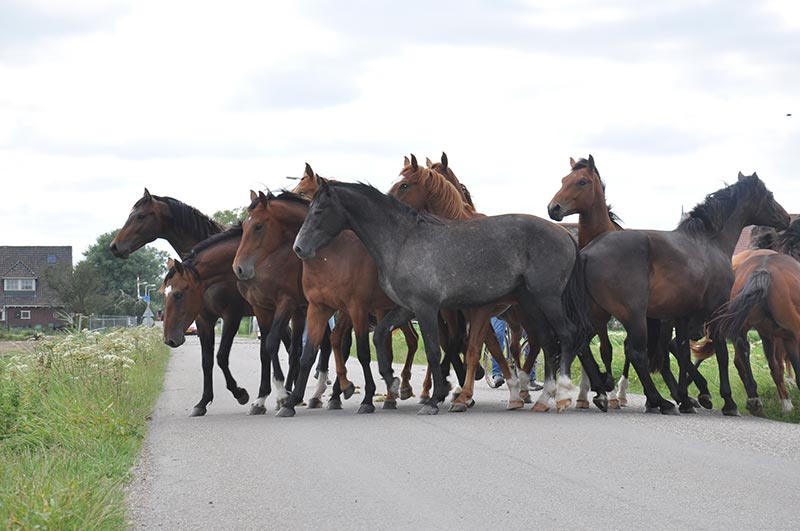
Dutch warmbloods are bred to be super stars in the sport horse world and it’s no surprise. The film, “Golden Genes” provides insight into a world previously unknown or unimagined. These Dutch breeders use a combination of knowledge, experience, and intuition to breed the future of the Dutch Warmblood breed, recognized the world over for it’s athleticism, intelligence, and star power in the show jumping arena.
If you are interested in show jumping, Dutch Warmbloods, or horses in general this is a documentary you won’t want to miss. I found the insight into this world very informative and eye opening.
Now, if only I could afford a Dutch Warmblood.
About the Author
Heather Wallace, ESMT, CCMT is a certified equine and canine sports massage therapist, co-owner of Bridle & Bone Wellness, and equestrian & canine blogger at Bridle & Bone. Her blog addresses important topics on natural health and wellness for horses and dogs. She is an adult amateur equestrian in unrequited loved with an OTTB and has two rescue dogs always up to no good.
You can find more interesting stories in our section on Recreation & Lifestyle.






